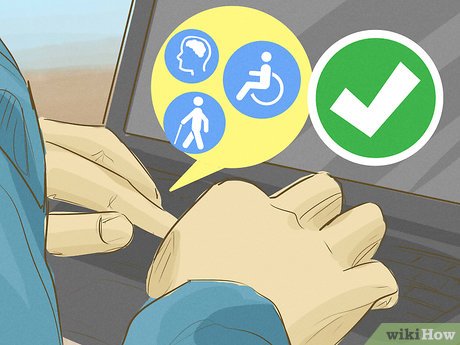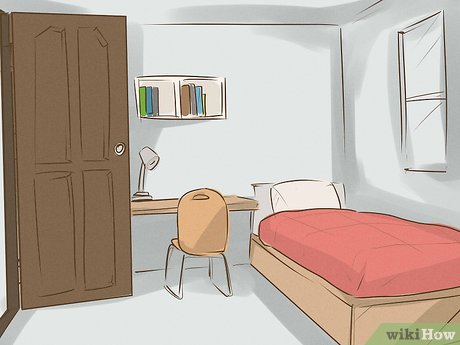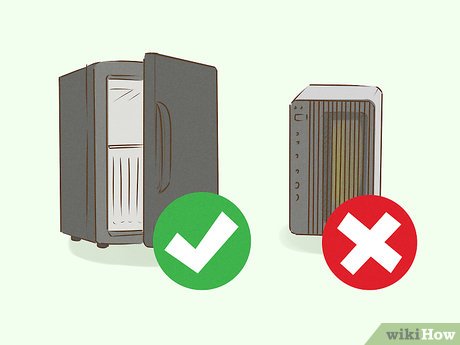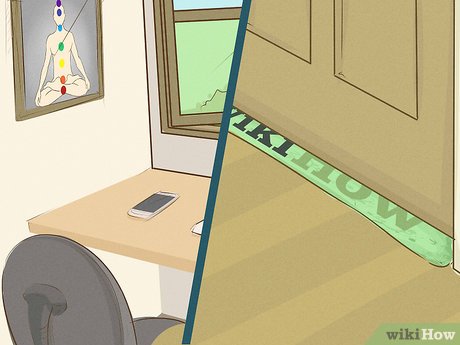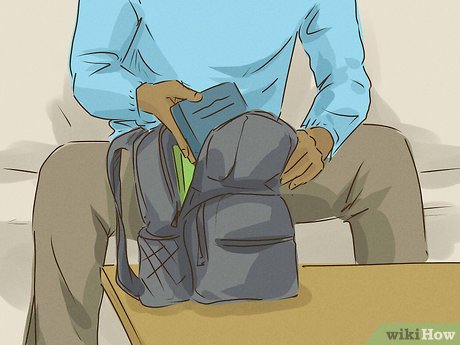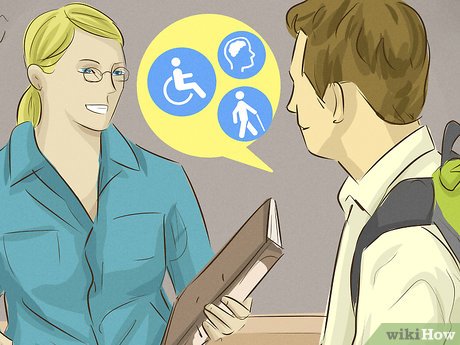How to Prepare for College if You're Autistic
Method 1 of 6:
Choosing a School
Many autistic students find it helpful to attend a college that's close to home, with good disability services.
-
 Consider community colleges or special programs to take before college. While some autistic students feel ready to start at a four-year college right after high school, others aren't ready, and that's okay.
Consider community colleges or special programs to take before college. While some autistic students feel ready to start at a four-year college right after high school, others aren't ready, and that's okay.- Larger cities might offer semester-long or year-long programs for autistic/disabled students to prepare for college or independent living.
- Some students prefer to start at a local community college, then transfer to a four-year university after two years.
- Research your options and talk with your family/mentor(s) about what feels right for you.
-
 Look at schools close to home. Being in a familiar area can reduce anxiety about change, and if you have a good relationship with your family, then it can be very nice to visit home often.
Look at schools close to home. Being in a familiar area can reduce anxiety about change, and if you have a good relationship with your family, then it can be very nice to visit home often.- You may be able to come home every weekend. This way, you won't miss your family too much.
-
 Research which schools have good disability services. Disability services can be a lifeline for disabled students, including the autistic ones. These service centers offer accommodations (like extra time on tests) and can include mentors who will offer advice about everyday problems you might face.
Research which schools have good disability services. Disability services can be a lifeline for disabled students, including the autistic ones. These service centers offer accommodations (like extra time on tests) and can include mentors who will offer advice about everyday problems you might face.- Larger schools typically have better disability services, because they have more disabled students.
- Ask around in the disability community (online, through your therapist, through a local disability club/meet-up) about which local schools have good disability services.
-
 Consider your interests and career path. What do you want to study? What type of major sounds ideal for you? Think about what's interesting, and what will pay enough as a career.
Consider your interests and career path. What do you want to study? What type of major sounds ideal for you? Think about what's interesting, and what will pay enough as a career.- Some schools want you to declare your major right away. Others (usually liberal arts schools) say you can wait a year or two.
- Your major doesn't have to be your most favorite thing. It's okay if it's not your passion. But you should be interested in it, and okay with doing something similar to it for the rest of your life. If you hate it, then you are in the wrong major!
-
 Consider reputation and stress level. Many autistics don't do well under high amounts of stress, so you may want to avoid schools that are too difficult. You want to be challenged, but not so challenged that you have problems with anxiety or stress.
Consider reputation and stress level. Many autistics don't do well under high amounts of stress, so you may want to avoid schools that are too difficult. You want to be challenged, but not so challenged that you have problems with anxiety or stress. -
 Tour your most favorite schools. Take a tour with a loved one, and look around. This can help you imagine what it might be like to study there. You can take an official tour, or look around by yourself or with a loved one.
Tour your most favorite schools. Take a tour with a loved one, and look around. This can help you imagine what it might be like to study there. You can take an official tour, or look around by yourself or with a loved one. -
 Apply, see where you get in, and make your decision. While it's okay to consult other people on your school choice, make sure that you're doing what feels best for you, your financial situation, and your career.
Apply, see where you get in, and make your decision. While it's okay to consult other people on your school choice, make sure that you're doing what feels best for you, your financial situation, and your career.
Method 2 of 6:
Preparing to Move In
-
 Seriously consider getting your own bedroom in your dorm. Sensory issues, sleeping problems, social struggles, and need for lots of quiet time are common issues that autistics face. It's best if you have your own sanctuary, without needing to negotiate rules with a roommate.
Seriously consider getting your own bedroom in your dorm. Sensory issues, sleeping problems, social struggles, and need for lots of quiet time are common issues that autistics face. It's best if you have your own sanctuary, without needing to negotiate rules with a roommate.- This should be arranged long before you move in.
- You do not want to get exhausted at college. Sleep deprivation and lack of alone time can take a very large toll on autistics. Having your own quiet space is usually for the best.
- Disability services can help you get your own room. Sometimes this means getting a "medical single." Other times, you might have a suite with your own bedroom and a shared kitchen/bathroom.
-
 Start packing early. Some autistic people can get mentally and emotionally overwhelmed quickly. If you start early, this allows you to work in short bursts with plenty of breaks in between.
Start packing early. Some autistic people can get mentally and emotionally overwhelmed quickly. If you start early, this allows you to work in short bursts with plenty of breaks in between. -
 Get in touch with your roommate(s) or suitemate(s). You can get to know them via email or text, and find out what you have in common. This friendly chatting can help you feel like you won't be moving in with a stranger.
Get in touch with your roommate(s) or suitemate(s). You can get to know them via email or text, and find out what you have in common. This friendly chatting can help you feel like you won't be moving in with a stranger.- You don't need to explain that you're autistic if you're worried about being stereotyped. You can say things like "I'm a quiet person" or "I have a disability," and then disclose your autism once they've gotten to know you (or never, if you prefer).
-
 Get a checklist of items you need for your dorm. You can often find dorm move-in checklists online to help you figure out what to pack. Then pack the things that you use in your ordinary routine. (For example, if the list says "hairdryer," but you never use a hairdryer, there's no need to pack one.) Consider areas like:
Get a checklist of items you need for your dorm. You can often find dorm move-in checklists online to help you figure out what to pack. Then pack the things that you use in your ordinary routine. (For example, if the list says "hairdryer," but you never use a hairdryer, there's no need to pack one.) Consider areas like:- Bedding
- Clothing and laundry
- Dishes (if you don't plan on eating at the cafeteria)
- Toiletries
- School supplies
- Stim toys and comfort objects
-
 Keep the size of your dorm room in mind. You don't want to over-pack, or bring furniture that won't fit. Most dorms provide basic furniture: bed, desk, chair, nightstand, dresser.
Keep the size of your dorm room in mind. You don't want to over-pack, or bring furniture that won't fit. Most dorms provide basic furniture: bed, desk, chair, nightstand, dresser.- Find out ahead of time whether the dorms have single or double beds, so that you bring the right kind of sheets.
-
 Consider what is and isn't allowed for students. Dorm regulations are meant to protect against fires, and the rules at school may be stricter than the rules in your home.
Consider what is and isn't allowed for students. Dorm regulations are meant to protect against fires, and the rules at school may be stricter than the rules in your home.- Many schools allow mini fridges.
- Some schools allow microwaves.
- Most schools do not allow candles, space heaters, or anything that could be a fire hazard.
-
 Choose suitable clothing for the weather. Be ready for hot days, cold days, and rainy days. Choosing how much and what to pack can depend on how often you get to go home, and what the climate is like.
Choose suitable clothing for the weather. Be ready for hot days, cold days, and rainy days. Choosing how much and what to pack can depend on how often you get to go home, and what the climate is like.- If you plan to go home each weekend, then you only need enough clothes for the week. If you don't plan to go home often, you'll need clothes for the whole range of weather.
- Even in hot climates, you should bring some sweaters and maybe a coat for cold mornings or evenings. Hats and gloves are also a good idea.
- Some weeks might be unusually hot or unusually cold. Be ready for weather out of the ordinary.
- Most of your clothes can be casual, but include some dressier things in case you have presentations or fancy events.
-
 Pack health and safety items for emergencies. You may not use a first-aid kit every day or even every month, but if you hurt yourself, you will be glad to have it. Some people also prefer to bring sewing kits and some basic tools so that they can fix things, though these are optional.
Pack health and safety items for emergencies. You may not use a first-aid kit every day or even every month, but if you hurt yourself, you will be glad to have it. Some people also prefer to bring sewing kits and some basic tools so that they can fix things, though these are optional. -
 Consider whether your dorm has heating and air conditioning. Most buildings do, but older ones might not. If your dorm doesn't, you need to be prepared.
Consider whether your dorm has heating and air conditioning. Most buildings do, but older ones might not. If your dorm doesn't, you need to be prepared.- For no air conditioning, make sure to bring a fan or two, and some very light clothing and pajamas. If you're bringing a mini fridge with a freezer, get ice cube trays and popsicles to help you stay cool.
- For no heat, bring hats, gloves, thick sweaters/coats, fuzzy socks, and scarves. You can wear these indoors on a cold morning. An extra blanket for your bed might also be good.
-
 Pack a few decorative items. Posters and photos can help make a dorm room feel like home. Rugs are cozy, and can also block some sound and hold in heat when it's cold. You might also bring some boxes or storage cubes if there's room, and try looking for items in your favorite colors.
Pack a few decorative items. Posters and photos can help make a dorm room feel like home. Rugs are cozy, and can also block some sound and hold in heat when it's cold. You might also bring some boxes or storage cubes if there's room, and try looking for items in your favorite colors. -
 Pack any pills and medications you might need. This includes prescribed medication, and over-the-counter supplements like melatonin. Make sure that you will have enough.
Pack any pills and medications you might need. This includes prescribed medication, and over-the-counter supplements like melatonin. Make sure that you will have enough.- If you tend to get headaches or stomachaches from stress, be sure to pack medicine for those. It's normal for autistic people to experience extra stress during transitions. (It's likely to go away once your classes get started.)
- If you have anti-anxiety medication for emergencies (such as Xanax or Ativan), make sure you have packed enough. Keep it somewhere discreet, so people don't try to buy or steal any of it from you.
Method 3 of 6:
Preparing for Classes
-
 Get your class schedule ready. It can help to make a visual schedule of where you need to go on which days.
Get your class schedule ready. It can help to make a visual schedule of where you need to go on which days.- Try organizing your schedule in a table so you can visualize the passage of time.
- Write down the class name and number, building, room number, and professor name.
- Try printing out a map and circling the buildings you'll go to in highlighter.
-
 Get oriented around campus before your classes start. Travel to each building and find the room if you can. This will help you avoid getting lost on your first day.
Get oriented around campus before your classes start. Travel to each building and find the room if you can. This will help you avoid getting lost on your first day.- Ask for directions if needed. Refer to your map and written schedule.
- Consider other points of interest that might be useful to you, such as bicycle parking, bus stops and train stations, accessible bathrooms, cafeterias, libraries and study halls.
-
 Prepare your school materials. Make sure that you have everything available as needed.
Prepare your school materials. Make sure that you have everything available as needed.- Agenda, calendar, to-do list, or to-do list app
- Textbooks
- Laptop (if you can afford it) or notebooks
- Folders for assignments and handouts
- Loose leaf paper, pencils, and erasers (even if you type notes, you may be given quizzes to write by hand)
- Small, silent fidget toys to keep your hands busy in class (e.g. stress ball, koosh ball, tangle toy)
-
 Plan out how you will stay organized. Organization can be a challenge for autistic students, especially those who have serious executive dysfunction. Having a plan in place can help you manage your workload.
Plan out how you will stay organized. Organization can be a challenge for autistic students, especially those who have serious executive dysfunction. Having a plan in place can help you manage your workload.- Alarm: Will you use your phone, or a clock? Will you set multiple alarms? Do you want an alarm to tell you when to go to bed, too, so you don't stay up too late?
- Agenda: How will you keep track of your schoolwork? Will you use an agenda, a calendar, or an app like Habitica or ToDoIst?
- Time Management: Will you want a timer or alarm? Do you want an alert to remind you to leave for class? Will you set timers to budget your free time and your study time?
- Appointments: Will you use a calendar? Do you want alerts or reminders?
Method 4 of 6:
Preparing with Disability Services
-
 Connect with disability services early on. Your school's disability service center can help you get started. You will need to provide proof of your disability, and the center can tell you what type of proof they need. (A letter from a doctor or psychologist may cover it.)
Connect with disability services early on. Your school's disability service center can help you get started. You will need to provide proof of your disability, and the center can tell you what type of proof they need. (A letter from a doctor or psychologist may cover it.)- Autism counts as a disability. Whether you have other disabilities too or not, the disability services are meant for people like you.
- Anxiety, depression, ADHD, Tourette Syndrome, bipolar disorder, and other disabilities are also examples of things covered by disability services. If you have any of these, or similar things, you can provide proof.
-
 Talk about what kind of accommodations you might need. Different schools offer different accommodations, but a lot of them are the same. Special accommodations include things like:
Talk about what kind of accommodations you might need. Different schools offer different accommodations, but a lot of them are the same. Special accommodations include things like:- Extra time on tests
- A private room to take your tests
- A note-taker (another student who will share their notes with you)
- Sitting in disability seating up front (though you usually don't need special permission for this)
- A sign language interpreter
-
 Ask them about what you need to do to get started.
Ask them about what you need to do to get started. -
 Talk to them about disclosing your disability to professors. Your professors need to know that you're disabled (though they don't need to know what type of disability it is), and they need to know what accommodations you have. There's typically a protocol for letting professors know. You may be given a letter to hand to your professors, or the disability center may email them about you.
Talk to them about disclosing your disability to professors. Your professors need to know that you're disabled (though they don't need to know what type of disability it is), and they need to know what accommodations you have. There's typically a protocol for letting professors know. You may be given a letter to hand to your professors, or the disability center may email them about you.- It's good to go up to your professor after class or during office hours to give them a heads-up that you're disabled, and what your accommodations are. If you're a fidgeter or you look different (e.g. wearing headphones or sunglasses in class), you can let them know that it's because of your disability and it helps you focus.
- It's okay to feel nervous about this. It usually goes well, though. Most professors don't treat it like a big deal and are happy to help you as needed.
-
 Feel free to ask people at disability services about preparing for starting college. They have helped plenty of students get started at college, and they know the routine. Don't be afraid to reach out with questions or problems. They will likely be happy to help you.
Feel free to ask people at disability services about preparing for starting college. They have helped plenty of students get started at college, and they know the routine. Don't be afraid to reach out with questions or problems. They will likely be happy to help you.
Method 5 of 6:
Preparing Emotionally
-
 Recognize all the ways that college can be better than high school. While college is hard, it does have some serious upsides. People are here by choice, and you get to choose what you want to do.
Recognize all the ways that college can be better than high school. While college is hard, it does have some serious upsides. People are here by choice, and you get to choose what you want to do.- You choose your major. You get to take classes based on what you want. While you'll have to meet some breadth requirements, you can choose what looks most interesting in that area.
- You get to choose your classes and your professors. You can steer clear of things you don't like, or professors with bad reputations.
- Colleges' reputations are based on whether their students succeed. Professors choose their work because they like it. You may find that the faculty is more caring here than at high school.
- Your peers chose to be here. While people do goof off sometimes, your classmates are generally motivated and interested in succeeding.
- People are generally more tolerant. While this is not always the case, people in college are a lot more open-minded and tolerant to people with disabilities than in high school. College is a time to expand your horizons and to learn new things, experience different cultures and human differences, and people may start to see the positive aspects of autism as well instead of just the negative.
-
 Keep in mind that your peers are nervous too. You aren't the only one starting college for the first time, and neurotypicals stress about this too. Being stressed is natural, and everyone is struggling to adjust, whether they show it or not.
Keep in mind that your peers are nervous too. You aren't the only one starting college for the first time, and neurotypicals stress about this too. Being stressed is natural, and everyone is struggling to adjust, whether they show it or not. -
 Prepare comfort strategies. How will you relax? What will help you unwind? Bring things that work for you, from relaxation tools to special interest accessories.
Prepare comfort strategies. How will you relax? What will help you unwind? Bring things that work for you, from relaxation tools to special interest accessories.- Make sure to bring your favorite music and photos.
- Set aside an interesting show or movie to watch once you have moved in. This gives you something to look forward to.
- Consider bringing stuffed animals. Most female college students bring more than one. Male students are less likely to do so, but can if desired.
-
 Plan out how you'll stay in touch with loved ones. Could you email, call, or video chat? Ask your loved ones when they usually have free time, so that you know the best times to call.
Plan out how you'll stay in touch with loved ones. Could you email, call, or video chat? Ask your loved ones when they usually have free time, so that you know the best times to call.- For the first week, try pre-arranging certain times to call home for emotional support. (In general, you'll probably be calling home more at first or during stressful times, and less when things are going well.)
-
 Recognize that hardship will pass. College is a big adjustment, and you'll get stressed no matter how well you are prepared. This is normal, and okay. It will get easier once you've adjusted. Do your best to ride it out and keep taking good care of yourself.
Recognize that hardship will pass. College is a big adjustment, and you'll get stressed no matter how well you are prepared. This is normal, and okay. It will get easier once you've adjusted. Do your best to ride it out and keep taking good care of yourself.
Method 6 of 6:
Starting College
-
 Move in early. It's better to have extra time so that you can go more slowly and take breaks as needed. If you have roommates or suitemates, this will also give you time to chat and get to know them.
Move in early. It's better to have extra time so that you can go more slowly and take breaks as needed. If you have roommates or suitemates, this will also give you time to chat and get to know them.- Notice if you're missing anything, and write it on a list.
-
 Buy anything you forgot to pack. It's normal to forget a thing or two when you're first moving in. Run to a nearby convenience store (or the school store) and buy what you need.
Buy anything you forgot to pack. It's normal to forget a thing or two when you're first moving in. Run to a nearby convenience store (or the school store) and buy what you need. -
 Schedule relaxing activities for the evening. You'll probably feel worn out or stressed from the big transition, which is normal. Do something that calms you down and makes you happy, like doing something related to your special interest or watching a show.
Schedule relaxing activities for the evening. You'll probably feel worn out or stressed from the big transition, which is normal. Do something that calms you down and makes you happy, like doing something related to your special interest or watching a show. -
 Go to bed early enough. Staying up late may make you feel less energetic for classes the next day. A good sleep will help you feel alert and prepared on your first day of classes.
Go to bed early enough. Staying up late may make you feel less energetic for classes the next day. A good sleep will help you feel alert and prepared on your first day of classes.- If you're having trouble quieting your mind, try doing a relaxing thing (like completing puzzles on your phone or watching animal videos). If you have special anti-anxiety or sleeping medicine, consider using it.
-
 Go to class early. Leaving for class early will help you have extra time in case you get lost. Once you're there, you'll be able to look around and settle in without rushing. (If the professor arrives early too, you'll also make a good first impression by being early.)
Go to class early. Leaving for class early will help you have extra time in case you get lost. Once you're there, you'll be able to look around and settle in without rushing. (If the professor arrives early too, you'll also make a good first impression by being early.)- If you get very lost and show up late, most professors understand that. Some people do get lost in the first week.
Share by
Lesley Montoya
Update 24 March 2020


